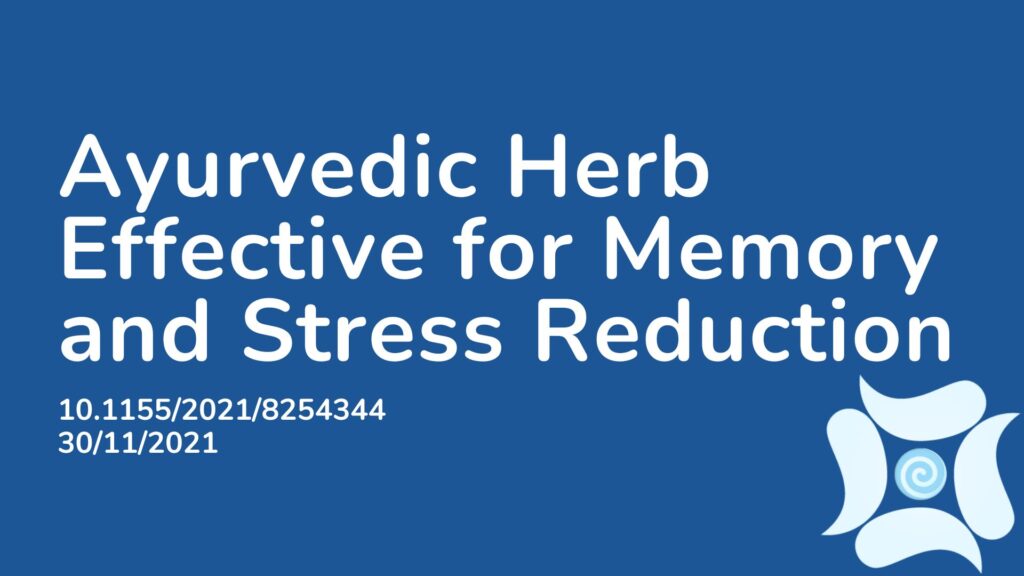Summary:
Stress is increasingly common worldwide and can harm cognitive and mental well-being. Ashwagandha, an herb used in Ayurvedic medicine, is known for its potential to reduce stress and possibly improve memory. This research conducted a randomized, double-blind, placebo-controlled study where participants were assigned to either Ashwagandha or a placebo. The study aimed to evaluate how a specially formulated slow-release capsule of Ashwagandha extract (300 mg) affected cognitive function, stress levels, sleep quality, overall well-being, and safety in individuals experiencing stress and anxiety. Healthy adults aged 20-55 with moderate stress (scoring 14-24 on a stress test) took either Ashwagandha or a placebo daily for 90 days. The researchers used tests to measure changes in cognitive function from baseline, as well as anxiety levels, cortisol levels in the blood, sleep quality, and levels of the brain chemical BDNF. The results showed that compared to the placebo, Ashwagandha helped improve memory, reduced self-reported stress levels, lowered cortisol levels, improved sleep quality, and enhanced feelings of happiness. The treatment was safe, with no reported side effects. This study concludes that Ashwagandha may be beneficial for memory enhancement, stress reduction, better mental health, and improved sleep quality over a 90-day period.
Abstract:
The global prevalence of stress is increasing. Stress adversely affects cognitive ability, sleep quality, and overall psychological well-being. Ashwagandha (Withania somnifera (L.) Dunal), an essential medicine in Ayurveda, is reportedly beneficial in reducing stress and improving memory. This double-blind, randomized, placebo-controlled clinical study evaluated the effect of Ashwagandha root extract sustained-release capsule 300 mg (Prolanza™; hereafter Ashwagandha SR) on cognitive functions, stress levels, sleep quality, overall well-being, and safety in stressed subjects. Methods: Subjects (130 healthy cognitively sound adults [20–55 years, body mass index:18–29 kg/m2]) having a Perceived Stress Scale (PSS) score of 14–24 were randomized to receive either Ashwagandha SR or placebo. Subjects took one capsule of Ashwagandha SR or placebo daily for 90 consecutive days. This study was registered on Clinical Trials Registry-India (CTRI) on 13/11/2019 [number: CTRI/2019/11/021990]. The primary endpoint was the change in cognitive function as measured by CANTAB from baseline to the end of the study period (90 ± 7 days). The secondary outcomes included the change in PSS-10 score, serum cortisol level (9–11 am), the OHQ score, the PSQI, and serum BDNF levels. Results: Only 125 completed the study and were evaluated. The Cambridge Neuropsychological Test Automated Battery (CANTAB) reported significantly improved recall memory, and the total error rate in recalling patterns significantly decreased at visit 4 in the Ashwagandha SR group vs. the placebo group (first attempt memory score:12.9 ± 6.7 vs. 10.1 ± 6.3; total errors:17.5 ± 23.3 vs. 27.7 ± 23.6). At visit 4, lower PSS-10 score (13.0 ± 5.0 vs. 18.7 ± 4.6; p < .0001), serum cortisol levels (p=0.0443), and Pittsburgh Sleep Quality Index (PSQI) score (p < .0001) but higher Oxford Happiness Questionnaire (OHQ) scores (p < .0001) were seen in Ashwagandha SR vs. the placebo group, suggesting significantly lower stress levels and significantly better psychological well-being and sleep quality in the former. No adverse events were reported. Conclusions: This is the first clinical study assessing Ashwagandha SR for its safety and efficacy. Treatment with one Ashwagandha SR capsule once daily for 90 days improved memory and focus, psychological well-being, and sleep quality, reduced stress levels, and was safe and well-tolerated.
Article Publication Date: 30/11/2021
DOI: 10.1155/2021/8254344



